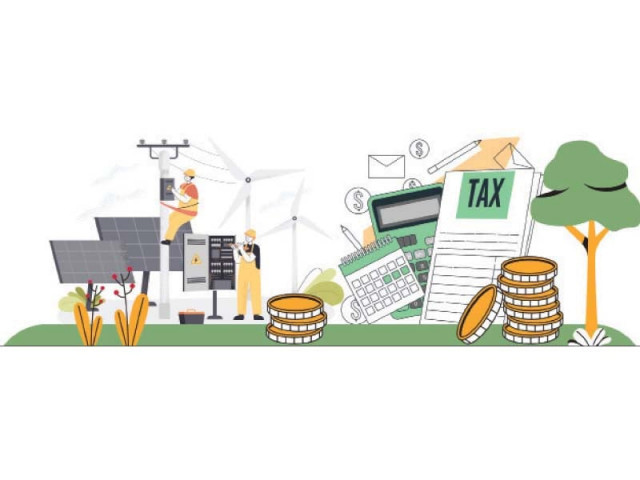Fiscal consolidation of Rs3.2tr sought
For this, govt aims to increase taxes on key sectors, return govt funds

The interim government has finalised its strategy to revive the economy, focusing on increasing taxes on key sectors, reducing pro-growth and general expenditures, and ending distortions in the energy sector through price adjustments and privatisation.
The Economic Revival Plan, spearheaded by Dr Shamshad Akhtar’s finance ministry, proposes a comprehensive fiscal consolidation of over 3% of the GDP or Rs3.2 trillion for the current fiscal year, as per government sources. This consolidation is intended to be achieved by eliminating tax exemptions worth Rs1.3 trillion and realising savings of Rs1.9 trillion in expenditures, including returning government funds to the central bank account. The government has also introduced a wealth tax on movable assets.
In the medium term, the Federal Board of Revenue (FBR) has put forward a plan to increase tax collection to Rs13 trillion within two years by elevating the current low tax-to-GDP ratio to 15% by the end of the fiscal year 2025. The government has identified a tax gap of Rs5.6 trillion attributed to exemptions and weak compliance. The interim government aims to generate an additional Rs5.6 trillion over two years, primarily through indirect taxes, constituting 68% of the plan.
It is suggested that there is potential to raise sales tax by Rs3 trillion, income tax by Rs1.8 trillion, and customs duty and federal excise duty by Rs800 billion.
The interim finance minister presented her economic revival plan to the Cabinet Committee on Economic Revival (CCER) a day earlier. The committee has endorsed the plan, which will now be shared with the Senate Standing Committee on Finance and with caretaker Prime Minister Anwaarul Haq Kakar, according to government sources.
Sources said that the CCER has endorsed the proposal to increase the tax burden on the agriculture sector, real estate, and retailers. The committee also supports the proposal to impose a wealth tax on movable assets by the FBR. Many of these tax proposals had been recommended by international organisations such as the World Bank or the FBR in previous budgets but were not implemented.
This week, the World Bank also recommended taxing sectors like agriculture and real estate to immediately increase Pakistan’s tax collection by 3% of the Gross Domestic Product, which, at the current projected size of the economy, amounts to around Rs3 trillion.
The previous PDM government had also finalised a proposal for imposing a wealth tax, known as the Income Support Levy, on all assets, including agriculture, with the aim of generating Rs200 billion. However, this proposal was eventually shelved by the previous government.
The Reform and Revenue Mobilisation Commission, led by Tola, had recommended the imposition of a Minimum Asset Tax on movable and immovable assets for resident individuals with asset values exceeding Rs100 million.
Sources said that due to constitutional obstacles, the interim government is focusing on imposing the wealth tax solely on movable assets.
The cabinet committee has also endorsed a proposal for rationalising government expenditures and scaling back subsidies and provincial grants. These proposals include bans on all types of purchases, creating new posts, foreign travel, and the withdrawal of security vehicles.
Major savings are expected from the privatisation of 14 loss-making entities in one year, the cessation of spending on devolved ministries to save another Rs330 billion, and sharing BISP spending with provinces to save Rs217 billion. The savings from the treasury single account are projected to be Rs420 billion.
The interim government is proposing to cut government expenditures by 10%.
The prime minister established the Cabinet Committee on Economic Revival with a mandate to assess macroeconomic situations and identify measures to ensure fiscal discipline.
Although there was no consensus on the size of the cut compared to the annual allocation of Rs950 billion for the Public Sector Development Programme (PSDP), the Ministry of Finance wanted to reduce the PSDP by Rs315 billion. However, the interim planning minister believed this would stifle economic growth, which is already projected to be below 2% by the World Bank.
The finance ministry suggested shifting infrastructure projects to Public Private Partnership (PPP) mode, but the planning minister argued that the PPP Authority was ineffective in handling these projects.
The revival plan emphasises strict implementation of International Monetary Fund (IMF) agreements, including tax collection and managing debt liabilities.
The Privatisation Commission will privatise selected Public Sector Enterprises using various methods, including assessing privatisation options for DISCOs, restructuring options for PIA-CL, and conducting unbundling studies for SNGPL and SSGCL.
The cabinet committee did not endorse the proposal to provide electricity subsidies to exporters or end cross-subsidisation of domestic consumers by industrial consumers. However, the committee will recommend measures to enhance exports, such as the implementation of the Weighted Average Cost of Gas (WACOG), operationalisation of EXIM bank with a general banking license, and expediting the clearance of sales tax refunds as priority short-term measures.
Additionally, proposals have been made to reduce freight charges, enhance ship recycling, develop port master plans, and revitalise the fisheries sector. Recommendations include focusing on governance, private sector participation, technology, digitalisation, and increasing the number of freight trains for Pakistan Railways.
The cabinet committee has also endorsed the renegotiation of energy agreements with private power plants.
Published in The Express Tribune, September 27th, 2023.
Like Business on Facebook, follow @TribuneBiz on Twitter to stay informed and join in the conversation.



















COMMENTS
Comments are moderated and generally will be posted if they are on-topic and not abusive.
For more information, please see our Comments FAQ